

How Posit Science's BrainHQ Helps People Sharpen Their Cognitive Abilities. Brain Aging: Staying Busy Will Keep Your Brain Young. One of the best ways to keep your brain sharp as you get older may be to stay busy, according to new research.

While scientists have previously recommended engaging in mentally challenging activities, a new study suggests that keeping a packed schedule may offer similar benefits. In a survey of over 300 people participating in the Dallas Lifespan Brain Study, study authors found that among adults over the age of 50, having a busy schedule was associated with better brain processing, improved memory, sharper reasoning and better vocabulary. People in the study ranged from 50 to 89 years old, and the positive effect of busyness on the brain was consistent across age. How Your Brain Cleans Itself—Mystery Solved? Thanks to a blood-brain barrier—a natural wall that protects the brain tissue—the organ never touches blood, thus protecting it from microbes, viruses, and other pathogens.
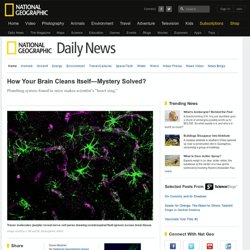
To get nutrients to brain tissue and remove its waste, the brain makes a liquid called cerebrospinal fluid. But exactly how the fluid removes gunk generated by brain cells wasn't certain until now. Experiments in the 1950s and '60s hinted that diffusion—the passive method by which, say, food coloring spreads out in a glass of water—moved cerebrospinal fluid around the brain. Yet this process is too slow to explain the brain's lightning-fast activity and immaculate cleanliness.
It turns out that, while studying brain tissue, the researchers in the 1950s and '60s unwittingly turned off the plumbing that washes the tissue. "The idea of a cleaning system based on pressure has been around for a long time, but if you open the skull anywhere, like a hydraulic pump, it stops. メンタルヘルスの国際比較. メンタルヘルス障害(心の病、精神疾患)は、個々人にとって苦痛であるばかりでなく、治療費や仕事の効率が落ちたり仕事ができないことによって失われる経済的なコストは計り知れない(DALY指標による寿命換算の社会的コスト計測の試みは図録2050参照)。
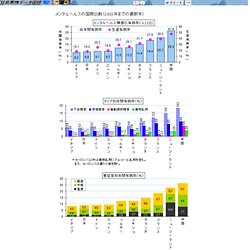
失われた経済的コストの金額評価は英国ではGDPの2%以上と見積もられている(OECD Factbook 2009)。 日本でもメンタルヘルスの問題は近年大きくクローズアップされているが、他国と比較して日本の状況はどの程度なのであろうか。 ここでは、WHOによって大規模に実施された疫学的調査(世界メンタルヘルス調査)の結果を引用しているOECD Factbook 2009のデータを使って各国比較のグラフを作成した。 調査では共通の診断法に基づき各種の障害と重症度、受診率(診療を受けたかどうか)の状況を調べている。 対象となった障害は、不安障害(anxiety disorders)、感情[気分]障害(mood disorders)、衝動調節にかかわる障害(disorders linked to impulse control)、アルコールや薬物の使用による障害(disorders due to use of alcohol and drugs)である。 自殺率の国際比較. 我が国における自殺者数の推移や自殺率の高さに関しては、自殺者数が史上最多を更新していることもあって大きな関心を呼び、本図録においても最もアクセスの多いテーマの1つとなっている(特に失業者数と自殺者数の月次推移や自殺者数の年次推移を掲載した図録2740)。
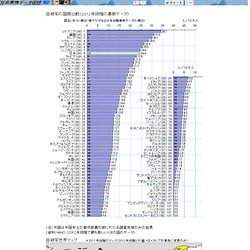
本図録が引用される掲示板等での議論を見ると「世界で最も高い日本の自殺率」などの表現も見られたため現時点での自殺率の国際比較の図録も追加することとした。 資料としてはWHOが世界各国から収集整理している自殺統計を使用した(原資料サイト)。 米国の銃による死者、15年までに自動車事故犠牲者上回る公算. 12月19日(ブルームバーグ):米国では長らく、銃と車は病気以外の主たる死亡原因となってきた。

しかし2015年までに、銃による死者が初めて交通事故の犠牲者を上回るもようだ。 Short Arms, Legs: A Risk For Dementia? The length of your arms and legs could help determine your risk for developing Alzheimer's disease and other forms of dementia .
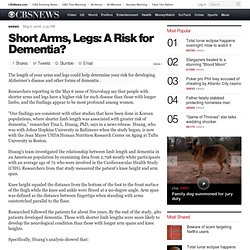
Researchers reporting in the May 6 issue of Neurology say that people with shorter arms and legs have a higher risk for such disease than those with longer limbs, and the findings appear to be most profound among women. "Our findings are consistent with other studies that have been done in Korean populations, where shorter limb length was associated with greater risk of dementia," researcher Tina L. Huang, PhD, says in a news release. Huang, who was with Johns Hopkins University in Baltimore when the study began, is now with the Jean Mayer USDA Human Nutrition Research Center on Aging at Tufts University in Boston. Huang's team investigated the relationship between limb length and dementia in an American population by examining data from 2,798 mostly white participants with an average age of 72 who were involved in the Cardiovascular Health Study (CHS).
Knee height and arm span. Articles A reflection of early life environment and risk of dementia T.
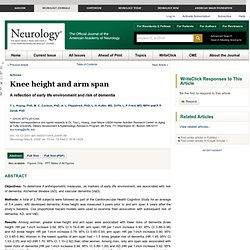
L. Huang, PhD, M. C. +Show Affiliations Address correspondence and reprint requests to Dr. Doi: 10.1212/01.wnl.0000311444.20490.98 Neurology May 6, 2008 vol. 70 no. 19 Part 2 1818-1826 Abstract Objectives: To determine if anthropometric measures, as markers of early life environment, are associated with risk of dementia, Alzheimer disease (AD), and vascular dementia (VaD). Methods: A total of 2,798 subjects were followed as part of the Cardiovascular Health Cognition Study for an average of 5.4 years; 480 developed dementia. Results: Among women, greater knee height and arm span were associated with lower risks of dementia (knee height: HR per 1-inch increase 0.84; 95% CI 0.74–0.96; arm span: HR per 1-inch increase 0.93; 95% CI 0.88–0.98) and AD (knee height: HR per 1-inch increase 0.78; 95% CI 0.65–0.93; arm span: HR per 1-inch increase 0.90; 95% CI 0.85–0.96).
Glossary Modified Mini-Mental State Examination; VaD= Examining Alzheimer's as a Syndrome. SRI International has remarkable facilities and success stories in drug development—but never in Alzheimer’s disease and other neurodegenerative disorders.

At the same time, never has the challenge to develop new therapeutics for these disorders been greater, as clinical trial after clinical trial of potential candidates has failed. The Alzheimer’s Drug Discovery Group at SRI is taking an innovative approach that recognizes and attempts to address the emerging concept that Alzheimer’s could be a syndrome, with multiple causes and incestuously interlocked effects. Single-target drugs have not, to date, been able to reverse, halt, or slow the progression of Alzheimer’s, at a cost of billions of dollars in research expenditures. If one looks at the current 92,237 papers that PubMed lists on the disorder, a reason begins to emerge.
Challenging jobs could be good for you.